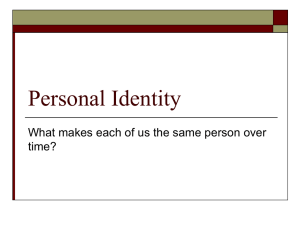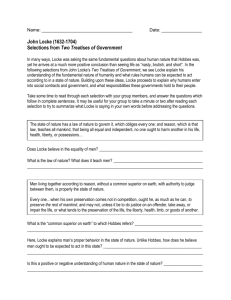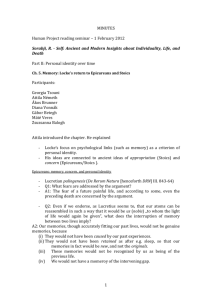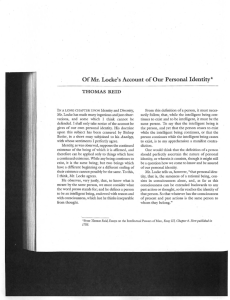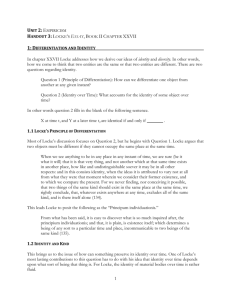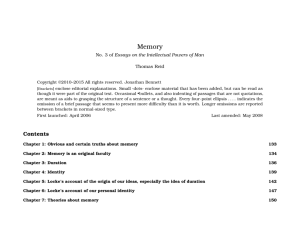john locke's theory of personal identity
advertisement
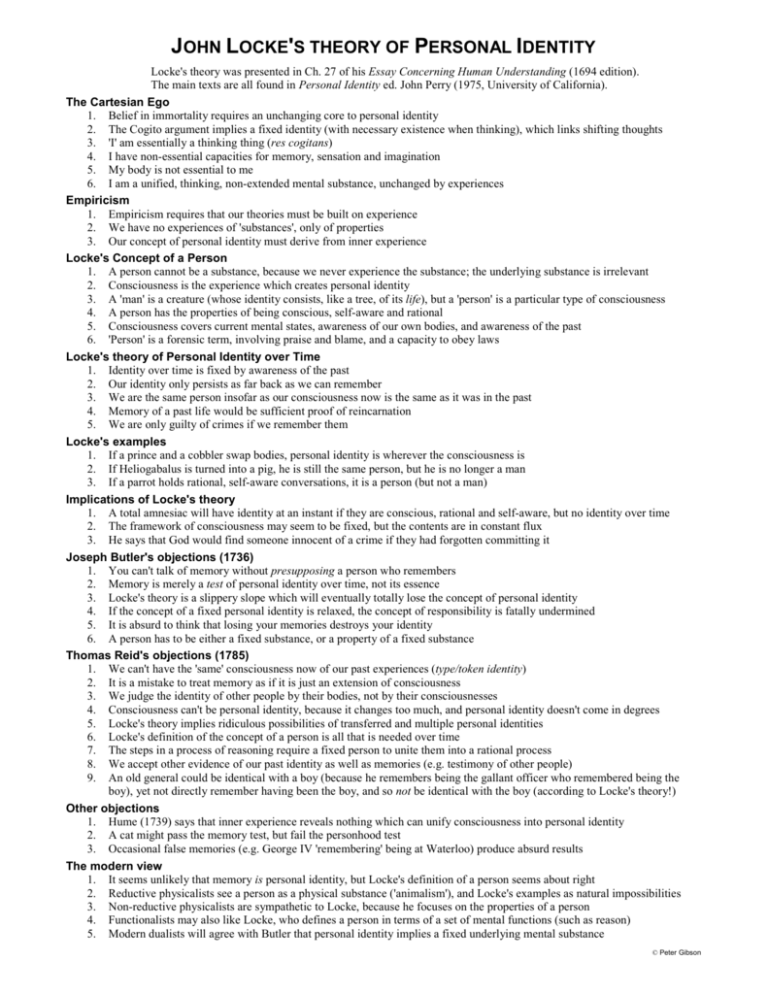
JOHN LOCKE'S THEORY OF PERSONAL IDENTITY
Locke's theory was presented in Ch. 27 of his Essay Concerning Human Understanding (1694 edition).
The main texts are all found in Personal Identity ed. John Perry (1975, University of California).
The Cartesian Ego
1. Belief in immortality requires an unchanging core to personal identity
2. The Cogito argument implies a fixed identity (with necessary existence when thinking), which links shifting thoughts
3. 'I' am essentially a thinking thing (res cogitans)
4. I have non-essential capacities for memory, sensation and imagination
5. My body is not essential to me
6. I am a unified, thinking, non-extended mental substance, unchanged by experiences
Empiricism
1. Empiricism requires that our theories must be built on experience
2. We have no experiences of 'substances', only of properties
3. Our concept of personal identity must derive from inner experience
Locke's Concept of a Person
1. A person cannot be a substance, because we never experience the substance; the underlying substance is irrelevant
2. Consciousness is the experience which creates personal identity
3. A 'man' is a creature (whose identity consists, like a tree, of its life), but a 'person' is a particular type of consciousness
4. A person has the properties of being conscious, self-aware and rational
5. Consciousness covers current mental states, awareness of our own bodies, and awareness of the past
6. 'Person' is a forensic term, involving praise and blame, and a capacity to obey laws
Locke's theory of Personal Identity over Time
1. Identity over time is fixed by awareness of the past
2. Our identity only persists as far back as we can remember
3. We are the same person insofar as our consciousness now is the same as it was in the past
4. Memory of a past life would be sufficient proof of reincarnation
5. We are only guilty of crimes if we remember them
Locke's examples
1. If a prince and a cobbler swap bodies, personal identity is wherever the consciousness is
2. If Heliogabalus is turned into a pig, he is still the same person, but he is no longer a man
3. If a parrot holds rational, self-aware conversations, it is a person (but not a man)
Implications of Locke's theory
1. A total amnesiac will have identity at an instant if they are conscious, rational and self-aware, but no identity over time
2. The framework of consciousness may seem to be fixed, but the contents are in constant flux
3. He says that God would find someone innocent of a crime if they had forgotten committing it
Joseph Butler's objections (1736)
1. You can't talk of memory without presupposing a person who remembers
2. Memory is merely a test of personal identity over time, not its essence
3. Locke's theory is a slippery slope which will eventually totally lose the concept of personal identity
4. If the concept of a fixed personal identity is relaxed, the concept of responsibility is fatally undermined
5. It is absurd to think that losing your memories destroys your identity
6. A person has to be either a fixed substance, or a property of a fixed substance
Thomas Reid's objections (1785)
1. We can't have the 'same' consciousness now of our past experiences (type/token identity)
2. It is a mistake to treat memory as if it is just an extension of consciousness
3. We judge the identity of other people by their bodies, not by their consciousnesses
4. Consciousness can't be personal identity, because it changes too much, and personal identity doesn't come in degrees
5. Locke's theory implies ridiculous possibilities of transferred and multiple personal identities
6. Locke's definition of the concept of a person is all that is needed over time
7. The steps in a process of reasoning require a fixed person to unite them into a rational process
8. We accept other evidence of our past identity as well as memories (e.g. testimony of other people)
9. An old general could be identical with a boy (because he remembers being the gallant officer who remembered being the
boy), yet not directly remember having been the boy, and so not be identical with the boy (according to Locke's theory!)
Other objections
1. Hume (1739) says that inner experience reveals nothing which can unify consciousness into personal identity
2. A cat might pass the memory test, but fail the personhood test
3. Occasional false memories (e.g. George IV 'remembering' being at Waterloo) produce absurd results
The modern view
1. It seems unlikely that memory is personal identity, but Locke's definition of a person seems about right
2. Reductive physicalists see a person as a physical substance ('animalism'), and Locke's examples as natural impossibilities
3. Non-reductive physicalists are sympathetic to Locke, because he focuses on the properties of a person
4. Functionalists may also like Locke, who defines a person in terms of a set of mental functions (such as reason)
5. Modern dualists will agree with Butler that personal identity implies a fixed underlying mental substance
© Peter Gibson




